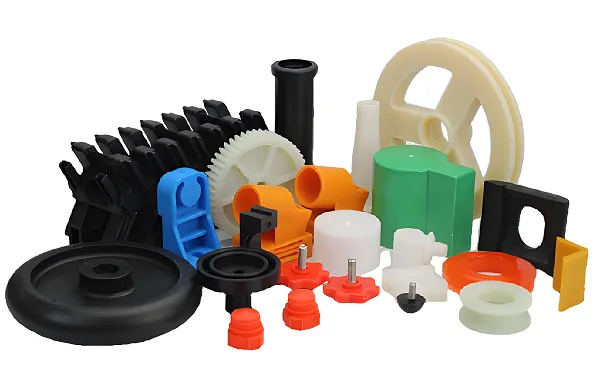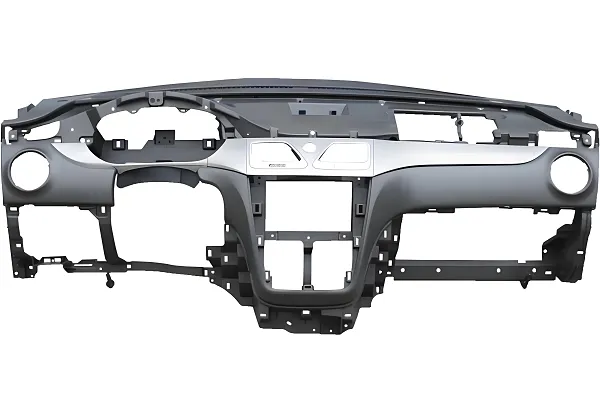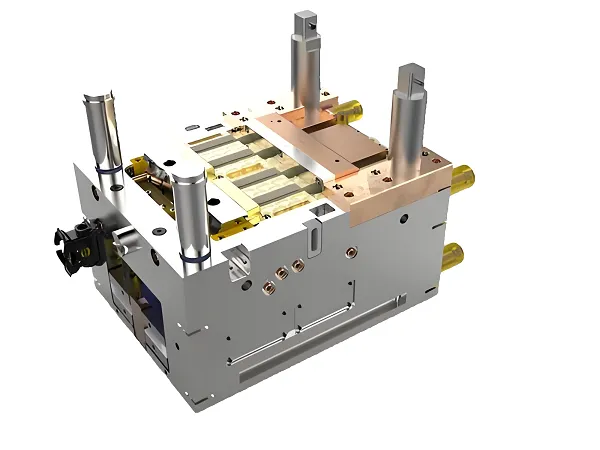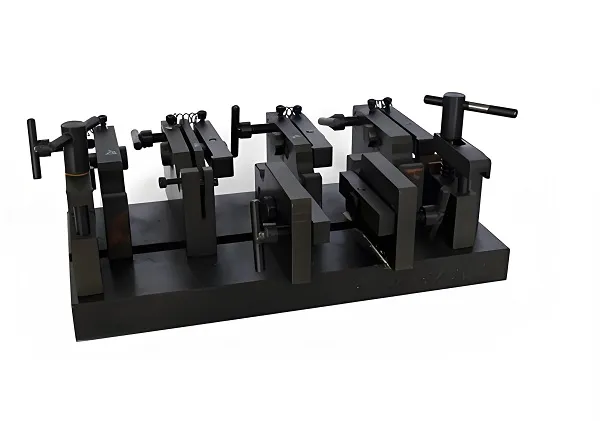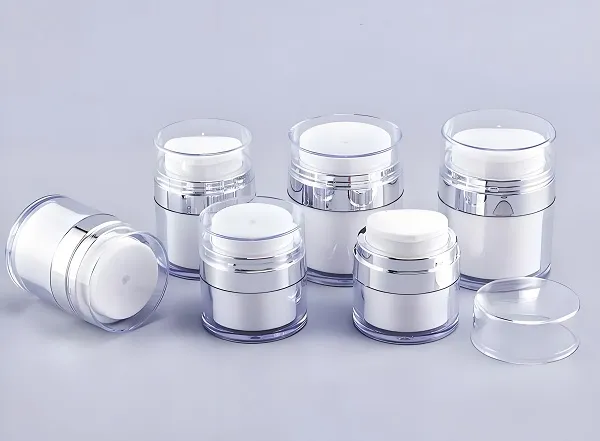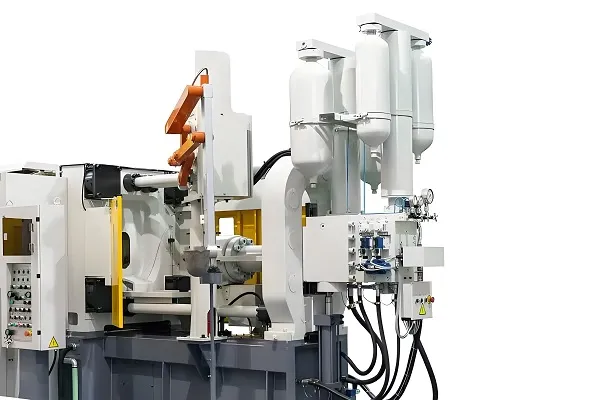Plastic washers are ring-shaped parts made of plastic that are typically used between connecting parts to protect the surfaces of the connected parts from damage and to distribute the pressure of the nut on the connected parts. Plastic washers are widely used in various fields such as semiconductor, automotive, aerospace industry and interior decoration due to their excellent insulation, corrosion resistance, heat insulation and non-magnetic properties, as well as their light weight.
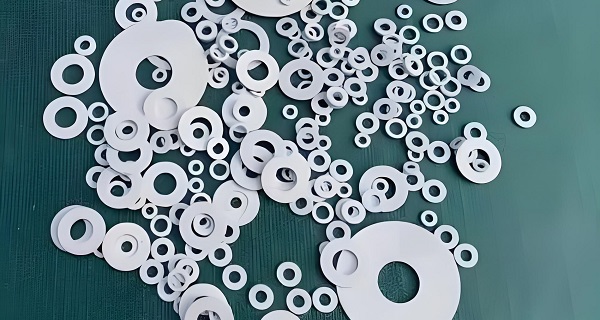
1.Material Selection
The choice of material for plastic washers is critical, and it directly affects the performance and service life of the washers. Common plastic washer materials include PA66 (nylon 66), PC, PEEK (polyether ether ketone), PPS (polyphenylene sulfide) and so on. Each of these materials has its own characteristics, such as high toughness, abrasion resistance and self-lubrication of nylon 66, while PEEK has excellent chemical resistance and heat resistance.
PA66 (Nylon 66)
Material Characteristics:
Mechanical Properties: PA66 has high mechanical strength and rigidity, with tensile strength typically between 70-120 MPa and flexural strength between 150-250 MPa. Its modulus is also relatively high, usually in the range of 2.5-4.5 GPa.
Abrasion and Creep Resistance: PA66 has excellent abrasion and creep resistance, making it suitable for the manufacture of highly loaded parts such as bearings and gears.
Thermal Stability: The heat deflection temperature (HDT) can reach 80-120°C under a load of 1.82 MPa, which maintains the stability of shape and properties at higher temperatures.
Chemical stability: good resistance to many chemicals such as alcohols, ethers, hydrocarbons and grease, but poor resistance to strong acids, alkalis and some chlorinated solvents (such as chloroform).
Electrical insulation properties: PA66 is an insulating material, volume resistivity is usually in the range of 1015-1016 Ω-cm, surface resistivity is higher.
Processing performance: It has good processing performance and can be molded by injection, extrusion, blow molding and other ways. The melting point is 260-270°C, and the processing temperature is usually in the range of 270-300°C.
Other parameters:
Continuous use temperature: 85°C
Color: translucent off-white
Flammability: UL94 V-2
PEEK (Polyetheretherketone)
Material properties:
Mechanical properties: PEEK has excellent mechanical properties, tensile strength up to 100 MPa, bending modulus up to 4.2 GPa.
High temperature resistance: excellent heat resistance, continuous use temperature up to 180 ℃, durable temperature range of -40 to 250 ℃ or -60 to 260 ℃.
Chemical stability: excellent chemical resistance, the only general-purpose chemical that can dissolve PEEK is concentrated sulfuric acid.
Other Properties: It also has excellent properties such as abrasion resistance, flame retardancy, and resistance to hydrolysis.
Other parameters:
Density: 1.3-1.5 g/cm³.
Thermal expansion coefficient: 3.3×10-5 K-1
Shore D hardness: 85
Submerged water absorption rate: 0.40%
PPS (polyphenylene sulfide)
Material Characteristics:
Heat resistance: PPS has excellent heat resistance, in the high-temperature atmosphere for a long time in the use of physical properties will not deteriorate.
Chemical stability: excellent chemical resistance.
Mechanical properties: excellent mechanical properties, good dimensional stability.
Electrical properties: excellent electrical properties.
Other parameters:
Continuous use temperature: 200°C
Flammability: UL94 V-0
PC (Polycarbonate)
Material Characteristics:
Impact resistance: PC has superb impact resistance and can maintain strong toughness and dimensional stability over a wide temperature range.
Transparency: High transparency, suitable for use in applications requiring transparency.
Processing performance: good processing performance, can be molded by injection molding and other ways.
Other parameters:
Continuous use temperature: generally unaffected by water temperature around 60℃, can be used in boiling water under limited conditions.
Other materials
In addition to the above materials, plastic washers may be made of a variety of other materials, such as PA6 (nylon 6), PTFE (polytetrafluoroethylene resin), PVDF (polyvinylidene fluoride resin), and so on. These materials have their own characteristics, such as PA6 moisture absorption but good oil resistance and chemical resistance; PTFE is inactive for almost all chemicals and solvents, and has excellent electrical properties and non-adhesion; PVDF has excellent chemical resistance and weather resistance.
When selecting a material, the most appropriate material needs to be determined based on the specific application scenario and needs. For example, gaskets working in high-temperature environments need to choose high-temperature-resistant materials; in the need for good insulating properties of the occasion should choose materials with excellent insulating properties. At the same time also need to consider the cost of materials, processing performance and environmental requirements and other factors.
In the customization process, according to the specific application scenarios and needs to choose the right material. For example, gaskets working in high-temperature environments need to choose high-temperature-resistant materials, while in the need for good insulation properties of the occasion, should choose materials with excellent insulation properties.
2. Production process
Plastic washers are usually produced using the injection molding process. This process uses an injection molding machine to inject the melted plastic material into the mold, through the cooling and curing to form the gasket. The injection molding process has the advantages of high production efficiency, high dimensional accuracy, high degree of automation, and is suitable for mass production.
*Preparation of raw materials
Material Selection: According to the application scenarios and requirements of the gaskets, choose the appropriate plastic materials, such as ABS, PP, PVC, PA66, PC, PEEK, PPS, etc.. Each of these materials has its own characteristics in terms of mechanical properties, heat resistance and chemical resistance.
Material treatment: Pre-treatment of selected raw materials, including color blending, viscosity adjustment, etc., to ensure that the material meets the production requirements. At the same time, attention is paid to selecting raw materials that meet quality standards and safety requirements.
*Injection molding
Preparation of injection molding machine: Check the status of the injection molding machine to ensure the normal operation of the equipment. Preheat the injection molding machine to make it reach the proper injection temperature.
Mold Installation: Install the designed molds to the injection molding machine and make debugging to make sure that the molds and the injection molding machine work well together.
Injection process: The pre-treated plastic granules are added into the hopper of the injection molding machine, and after being heated and melted, the molten plastic is injected into the mold through the screw or plunger of the injection molding machine. During the injection process, parameters such as injection temperature, injection time and injection pressure need to be strictly controlled to ensure the molding quality and precision of the gaskets.
*Mold design
Specification and size: According to the specification and size requirements of the washers, design a reasonable mold structure and size.
Material and hardness: Select the suitable material and hardness of the mold to ensure the abrasion resistance, corrosion resistance and high temperature resistance of the mold.
Repair and maintenance: Consider the repair and maintenance of the mold, and design a mold structure that is easy to disassemble and repair.
*Molding Processing
Demolding: After injection molding is completed, wait for the gaskets to cool and cure before removing the gaskets from the mold.
Cutting and trimming: Use sharp cutting tools to cut and trim the gaskets to remove excess burrs and flying edges to ensure that the size and shape of the gaskets meet the requirements.
Subsequent treatment: For some gaskets with special requirements, such as those that need to be varnished, wiped, painted, etc., carry out the corresponding subsequent treatment.
*Follow-up treatment
Quality inspection: Strict quality inspection is carried out on the produced plastic washers, including appearance inspection, size measurement, performance test, etc., to ensure that the quality of each washer meets the specified standards.
Packaging and storage: Use packaging materials and methods that meet the requirements to package the washers to prevent damage during transportation and storage. Meanwhile, pay attention to the temperature and humidity control of the storage environment to avoid moisture or deformation of the washers.
During the customization process, it is necessary to design the corresponding molds according to the specifications and shapes of the washers, and adjust the parameters of the injection molding machine to ensure product quality. At the same time, it is also necessary to carry out strict screening and pretreatment of raw materials to ensure the purity and performance of raw materials.
3. Specification customization
The customization of the specifications of plastic washers includes size, shape, thickness and other aspects. In the customization process, it is necessary to determine the specifications of the washer according to the specific application scenarios and needs. For example, in automotive manufacturing, different parts of the gasket may require different sizes and shapes; in the semiconductor industry, the gasket’s precision and cleanliness requirements are higher.
Therefore, it is necessary to fully communicate with customers during the customization process to understand their specific needs, and design and produce according to the needs. At the same time, it is also necessary to produce the gaskets for strict quality testing to ensure that it meets customer requirements.
4.Quality control
Quality control is an important part of customized plastic washers. In the production process, the need for raw materials, molds, injection molding machines and other aspects of strict quality control. At the same time, it is also necessary to produce washers for appearance inspection, size measurement, performance testing and other tests to ensure that its quality is stable and reliable.
In the quality control process, it is also necessary to establish a perfect quality management system and traceability mechanism, so that when problems occur, the cause can be quickly identified and appropriate measures taken.
Customized Plastic Washers FAQ
*. What are the common materials for custom plastic washers?
Common materials for custom plastic washers include nylon 66 (PA66), polycarbonate (PC), polyether ether ketone (PEEK), polyphenylene sulfide (PPS), polypropylene (PP), and ABS. Each of these materials has its own advantages in terms of mechanical strength, heat resistance, chemical resistance, insulation, etc., and the selection should be based on specific application scenarios and needs.
*. How to determine the specification and size of customized plastic washers?
The specifications and dimensions of a customized plastic washer are usually determined by the customer based on the specific application scenario and requirements. Customers need to provide detailed dimensional requirements such as the diameter, thickness, and bore diameter of the washer, as well as any special shape or structure requirements. In addition, the working environment of the washer, such as temperature, pressure, medium, etc., needs to be considered in order to select the appropriate material and design solution.
*. What is the machining lead time for customized plastic washers?
The processing cycle of custom plastic washers varies depending on a number of factors, including material selection, mold design, production batch size, and production process. Generally, it can take anywhere from a few days to a few weeks from receipt of an order to completion of production. In emergency situations, some manufacturers can provide expedited service to shorten the production cycle.
*. How to ensure the quality of customized plastic washers?
Guaranteeing the quality of custom plastic washers requires a number of things. Firstly, choosing high quality raw materials and proper production process is the key. Secondly, accurate design and production of the molds ensure that the size and shape of the washers meet the requirements. During the production process, strictly control the process parameters, such as injection temperature, injection pressure, cooling time, etc., to ensure the performance and appearance quality of the washers. Finally, strict quality inspection and testing are carried out to ensure that each washer meets the specified standards and requirements.
*. How is the price of customized plastic washers determined?
The price of custom plastic washers is usually determined by a combination of factors, including material cost, mold cost, production lot size, and complexity of the production process. Prices vary greatly from material to material, and the cost of molds can also vary depending on the complexity of the design and size. The larger the production lot, the relatively lower the unit price. In addition, the complexity of the production process and special requirements will also have an impact on the price. Therefore, it is necessary to fully communicate with customers before customization to clarify the requirements and conditions in order to give a reasonable quotation.
*. In what fields can Customized Plastic Washers be applied?
Customized plastic washers are widely used in many fields due to their excellent performance and wide range of applications. For example, in the automotive industry, plastic washers are commonly used for the connection and sealing of engines, transmissions and other components; in the field of electronics and electrical appliances, plastic washers are used for the insulation and fixing of circuit boards, switches and other components; and in machinery and equipment, they are used for the lubrication and vibration damping of bearings, gears and other transmission components. In addition, plastic washers are also used in aerospace, medical equipment, building decoration and many other fields.

